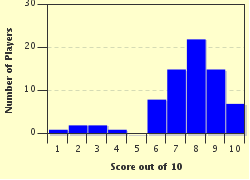Quiz Answer Key and Fun Facts
1. "I was going to invest some money in the deal, but the more I heard about it, the more I thought it sounded fishy," says someone in late-Victorian London. What does he mean?
2. A man has stolen something in late Victorian London. He wants to get rid of it, but wants to get some money out of it too, so he takes it to a ---. What word goes in the blanks?
3. No one makes clear who the first through third estates are, but a fellow says his friend is a member of the fourth estate, in Victorian London. What does his friend do?
4. In Victorian London, someone said he saw the frog's march being performed. You knew he hadn't been to the theatre, and instead had been in a bad neighborhood that evening. What typical happening did he see there?
5. A young woman in Victorian London is getting dressed to go out, making sure her dress, bonnet and hair are fixed just right. "How do my 'follow me, lads' look," she asks. What is she talking about?
6. "I detest flunkeyism," says a man in late Victorian London. What exactly does he not like?
7. "Oh, fiddle de dee!" Is that realistic slang for a woman in 1870s London?
8. "What a fire eater that man is," someone said in late Victorian England. The crowded streets were busy with people in the evening. What did they mean?
9. A person in Victorian England said he was flabbergasted after hearing something. What did he mean?
10. "He's an old fogey," reports someone in Victorian England. What does he mean?
Source: Author
littlepup
This quiz was reviewed by FunTrivia editor
ponycargirl before going online.
Any errors found in FunTrivia content are routinely corrected through our feedback system.

